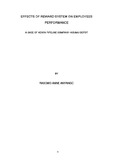| dc.description.abstract | Employer-Employee relations are concerned with managing and maintaining the employment relationship which involves handling the pay-work bargain, dealing with employment practices, terms and conditions of employment, issues arising from employment, providing employees with a voice and communicating with employees. They consist of the approaches and methods adopted by employers to deal with employees either collectively through trade unions or individually (Armstrong, M: 2009) The objectives of this study are to determine the influence of employer-employee relations on job satisfaction, to establish the effect of rewards on the job satisfaction of the employees, to establish the impact of maintenance of employees on the job satisfaction and to determine the impact of communication to employees on job satisfaction. The purpose of this study is to establish the influence of employer-employee relations on job satisfaction in an organization with special reference to Kenya pipeline company. This was achieved with the aid of the following objectives: To examine the influence of reward and benefits on job satisfaction, to establish the impact of maintenance on the job satisfaction, to determine the impact of communication between the employer and employees on job satisfaction and to determine the effect of grievance handling on job satisfaction. The study used the case study design that
involved in-depth investigation of the phenomenon under study. The study targeted a population of 823 employees, comprising the supervisory, confidential and the unionisable cadres. The population was stratified departmentally with each department made of 10% participants per each category. The study used simple random sampling. Closed-ended questionnaire was used to collect data from the field since the method is easy to analyze it is immediate usable form , economical reliable, affordable and easy to administer. The study is organized into five main chapters .The first chapter highlights the introduction, the second chapter presents the literature on the influence of employer-employee relations on job satisfaction ,the third chapter describes the target population,reasearch design, sample selection and size, research instruments ,validity and reliability. The fourth chapter presents the data analysis, interpretation, presentation and discussions and the fifth chapter presents the summary of findings, conclusions and recommendations. Data was analyzed using descriptive statistics to allow for cross-comparison and according to the objectives of the study and the mean gave the most popular results. The questionnaires were subsequently sorted, coded, categorized and finally tabulated. Data was presented using tables and pie charts. The findings of the study revealed the relationship between the employers and employees and their job satisfaction. Based on the study findings, the researcher recommended the way forward in improving the relationship between the management and the employees and their level of satisfaction. The study concluded that the employees were poorly remunerated, that they were satisfied to some extent with services such as housing, health ,security and sanitation, that the managements’ provision of the personal protective equipment indicated that it was concerned of the employees welfare, that ventilation ,lighting and working space was good and frequent managements’ meeting with employees denoted that the employees were given a chance to air their concerns to the management. The study also came up with contribution to the body of knowledge and also suggestions for further research which included the influence of Kenya Union Sugarcane Planters and Allied Workers recognition by management on job satisfaction and, the influence of training and development of employees on job satisfaction. | en_US |

